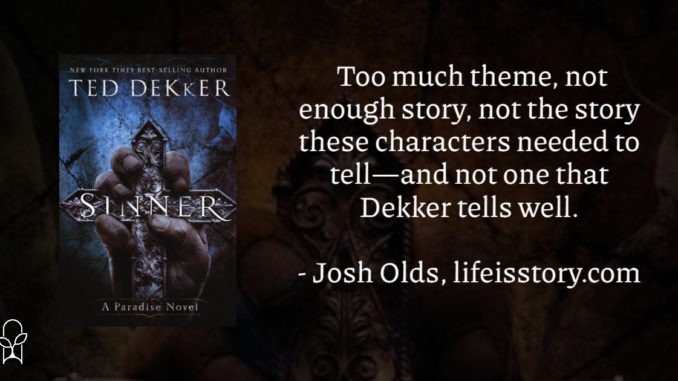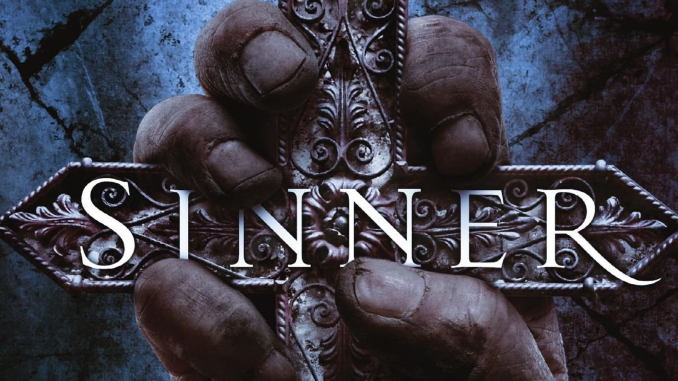
Also by this author: The Promise, The Drummer Boy, Green, The Dream Traveler's Quest, Into the Book of Light, The Curse of Shadownman, The Garden and the Serpent, The Final Judgment, Millie Maven and the Bronze Medallion, Millie Maven and the Golden Vial
Series: The Paradise Trilogy #3
Published by Thomas Nelson on September 2008
Genres: Fiction, Christian, Suspense
Buy on Amazon
Goodreads

Some say roll with the punches. Drift with the tide. Nothing can stop the inevitability of change. There was a time when 300 Spartans disagreed with such mindless thinking and stood in the gap. Now it's time for 3,000 to stand in the gap.
"Sinner" is the story of Marsuvees Black, a force of raw evil who speaks with wicked persuasion that is far more destructive than swords or guns. Beware all who stand in his way.
It's also the story of Billy Rediger and Darcy Lange, two unsuspecting survivors of a research project gone bad, who discover that they are perhaps the two most powerful souls in the land. Listen to them or pay a terrible price.
And it's the story of Johnny Drake, the one who comes out of the desert and leads the 3,000. Follow him and die.
"Sinner" tells the story of a free land where people who worship as they please and say what they believe are suddenly silenced in the name of tolerance.
Most will roll with the punches.
Most will drift with the tide. But not all.
Not the 3,000.
Billy Rediger has spent the last dozen years running from his past. It was he who wrote Marsuvees Black into existence and nearly destroyed himself and Paradise in the process. His attempt to soothe his troubled mind through gambling and booze hasn’t paid off and he finds himself in severe debt to an angry crime boss. But the tables turn when Billy suddenly discovers he has the ability to read minds.
Darcy Lange has also spent a dozen years trying to forget what havoc her thirteen-year-old self brought upon Project Showdown. Life is humdrum and Darcy is apathetic until one day she manifests the ability to persuade others. Almost immediately, Billy and Darcy find themselves reunited and under the care of a CIA agent named Kinnard — reunited because Billy felt the sudden urge to connect with Darcy after being reminded of her, and under the care of Kinnard because he knew of Project Showdown and was anticipating their abilities.
Meanwhile, the outside world is falling apart. Religion in the United States has become increasingly diverse, with more and more claiming no religion at all. Tolerance has become the mantra: everyone’s beliefs are equal and no one way is exclusive. But that mantra is beginning to be challenged. Religious-based hate crime is on the rise, with the lynching of Christians leading to a full-scale riot. Billy and Darcy are called in by the government to use their abilities to quell the crowd. In the middle of this are Katrina Kivi and Johnny Drake. Kat has been quite the teenage rebel and example of religious intolerance. A right hook to the face to a Muslim schoolmate landed her in community service and at the feet of Johnny Drake. Johnny takes in the young girl and through his own powers opens her eyes to the truth.
The religious situation continues to deteriorate, leading to the United States Congress—under influence from Billy and Darcy—to amend the First Amendment to outlaw hate speech such as claims of religious exclusivity. Johnny, Kat, and the residents of Paradise don’t intend to follow any such rules, boldly proclaiming their intentions to preach salvation through Christ alone. The final battle begins to rage as it pits one town against the nation, but even more importantly one man against himself—or one man against his creation. Marsuvees Black is back and he’s been manipulating things all along, baby.
As much as it pains me to say it, Sinner is an absolute disappointment. The plot is a discombobulated mess—you’ll notice I took 500 words to simply try to give a basic setup. Billy and Darcy have these amazing powers, yet their use of them extends to dispersing a crowd, showing off, and influencing a Senate vote. Honestly not that thrilling. While Saint portrayed Strople/Johnny’s power through assassinations and action sequences, Billy and Darcy get government meetings and terrible dialogue
Kat Kivi’s character, while dear to Dekker’s heart, was extraneous to this story. I know Ted’s reasons for writing her, I know of her significance and understand how she personalizes the story for Ted, but this is a Paradise novel and introducing a new character doesn’t work. It’s almost like, in trying to write everything, Dekker spread the story too thin and favored Sinner’s thematic elements over the story.
Which…I don’t know why Ted had this brief time period where he was suddenly worried about free speech (a year after this book was published, Ted’s novel Immanuel’s Veins would be banned in the Netherlands for its sensuality, but the timeline doesn’t fit) but in both this book and his Christmas gift book The Drummer Boy, Dekker turns into a raging fearmonger insisting that all religious freedoms will soon be going away. It’s a theme that’s tonally inconsistent with the Project Showdown series, reduces his most iconic villain to a government worker, and isn’t it just a bit ironic to publish a best-selling book complaining about the lack of freedom of speech?
Even if Dekker did treat the theme with the nuance and perspective it needed, it wasn’t a story that fit within the Project Showdown milieu. The story doesn’t fit the characters. Ted wanted to tell a different story, but here’s the story he had to write to finish the trilogy, and that’s why we get what we get.
What does work is the secondary theme of Billy’s fight against Marsuvees Black. This is what the story should have been about. There was the creation of evil (condemnation) and redemption through sacrifice (justification) in Showdown and the formation of spiritual identity (sanctification) in Saint. Sinner should have been about Billy and Darcy’s attempt to ultimately defeat evil as incarnated in Marsuvees Black (glorification). That would make the series a thematic parallel to Black, Red, and White as well. Showdown was written as a standalone novel years before it was published. After it was published, there had to be a follow-up. As such, neither Saint nor Sinner really seems to fit as sequels—but it’s especially egregious with Sinner. That ad hoc construction of the trilogy really impacts the whole of the overarching Books of History Chronicles narrative. A tighter, more focused plot that followed naturally out of Showdown and had more secure connections to the rest of the series would have not only improved Sinner, but the BoHC as a whole.
In the end, too much theme, not enough story, and this is not the story these characters needed to tell—and not one that Dekker tells well. The thematic fearmongering falls flat. Dekker does a disservice to his greatest villain. And the book is just slow and boring. Dekker fans need to read this to round out the Paradise Trilogy and flesh out their knowledge of The Books of History Chronicles, but this isn’t a book I’d otherwise read.


Be the first to comment